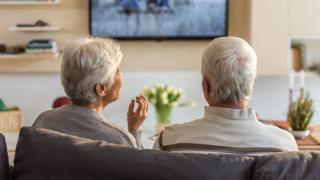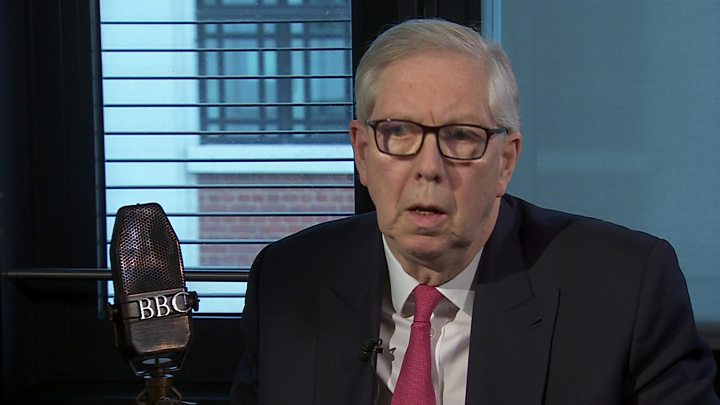TV licences: Up to 3.7 million over-75s to pay licence fee
 Image copyright Getty Images
Image copyright Getty Images Up to 3.7 million pensioners who previously received a free TV licence will now have to pay for it.
The BBC will scrap blanket free licences for over-75s, but those households with one person who receives pension credit will still be eligible.
The BBC said “fairness” was at the heart of the ruling, which comes into force in June 2020.
It follows a consultation with 190,000 people, of which 52% were in favour of reforming or abolishing free licences.
According to the BBC, around 900,000 households are claiming pension credit, which is a non-taxable weekly top up for pensioners based on a person’s income.
The number of households which could be eligible to apply for pension credit could number 1.5 million by 2020.
The BBC Board said it was the “fairest option to help the poorest pensioners”.
BBC chairman Sir David Clementi said it had been a “very difficult decision”.

Media playback is unsupported on your device
“We think it’s fair to those over 75 but also to all our audiences for whom there was no appetite for the level of cuts that would have been necessary if the concession had been extended,” he added.
“There are people for whom this will be unwelcome news, who have not paid until now but will do so.
“We know we have a loyal audience over the age of 75 and we think many of them will understand the difficult position we are in.”
Prime Minister Theresa May said she was “very disappointed” with the BBC’s decision.
Analysis by David Sillito, media correspondent
Free licences were given to the over-75s as part of a Labour government programme to reduce pensioner poverty. Fifteen years later that government funding was cut by the Conservatives.
Ever since then, the BBC has been pondering if it can afford to take on the bill. It’s a cost that’s rising every year as the number of pensioners continues to grow. In 2020 it’s estimated there will be around 4.6 million households with at least one pensioner.
This then is a compromise; around a third of the cost will be borne by the BBC and two thirds passed on to ‘wealthier’ pensioners. The elderly are by far the biggest consumers of the BBC’s output, the average age of BBC TV’s audience is now over 62, the question is how far younger licence fee payers should subsidise these older viewers.
As consumption of traditional TV by younger viewers continues to drop there could well be questions about why they are being expected to pay for a service that the heaviest users get for free.
The Department of Culture Media and Sport Committee said: “The ending of historically free TV licences for all those over 75, regardless of income, will mark a significant departure for the BBC and nearly four million pensioners who don’t pay for it.
“However, we know that the total cost to the BBC of picking up the provision of free licences was estimated at £725 million in the coming years, and growing.”
Chairman Damian Collins said: “The likely bill for paying for licences for those who receive pension credit is put at around £250 million which is still a considerable sum,” adding MPs would monitor “the impact this cost will have on the BBC’s future and its programming.”
Free licences were first introduced by then-Culture Secretary Chris Smith in 2000 at the same time as half-price licences for the visually impaired.
In 2015, the government announced the BBC would take over the cost of providing free licences for over-75s by 2020 as part of the fee settlement.
The cost was expected to total £745 million – a fifth of the BBC’s current budget by 2021/22.
The new scheme will cost the BBC around £250 million by 2021/22 depending on the take-up.
Following the announcement, TV Licensing is advising customers receiving a free licence that they need not take any immediate action.
Over the course of the next month, TV Licensing will be writing to everyone who currently has a free over-75 licence to let them know about the new scheme and make clear that they will remain fully covered until 31 May 2020.
A free telephone information line will also be launched this month where older customers and their relatives can access information on the new policy and a new “pay as you go” payment scheme will be launched from June 2020 which will let people spread the cost of the licence in fortnightly or monthly payments.
Condemning the new scheme, Caroline Abrahams from Age UK said: “One thing we’ve noticed through the consultation is how much older people value it, it might be a surprise to the BBC how important the TV is. One in four over-65s say this is their main form of companionship.”
The BBC’s consultation was announced in November last year. Nearly half of respondents (48%) said they were in favour of continuing concessions to over-75s.
Thirty-seven percent were in favour of reforming the current rules with 15% in favour of scrapping concessions of over-75s.




